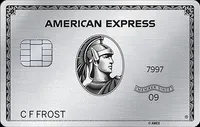Do I Still Need Travel Insurance If I Have Coverage Through a Credit Card?
Many credit cards offer travel insurance as a perk, but is the coverage comprehensive enough to skip buying a separate policy?


Profit and prosper with the best of Kiplinger's advice on investing, taxes, retirement, personal finance and much more. Delivered daily. Enter your email in the box and click Sign Me Up.
You are now subscribed
Your newsletter sign-up was successful
Want to add more newsletters?

Delivered daily
Kiplinger Today
Profit and prosper with the best of Kiplinger's advice on investing, taxes, retirement, personal finance and much more delivered daily. Smart money moves start here.

Sent five days a week
Kiplinger A Step Ahead
Get practical help to make better financial decisions in your everyday life, from spending to savings on top deals.

Delivered daily
Kiplinger Closing Bell
Get today's biggest financial and investing headlines delivered to your inbox every day the U.S. stock market is open.

Sent twice a week
Kiplinger Adviser Intel
Financial pros across the country share best practices and fresh tactics to preserve and grow your wealth.

Delivered weekly
Kiplinger Tax Tips
Trim your federal and state tax bills with practical tax-planning and tax-cutting strategies.

Sent twice a week
Kiplinger Retirement Tips
Your twice-a-week guide to planning and enjoying a financially secure and richly rewarding retirement

Sent bimonthly.
Kiplinger Adviser Angle
Insights for advisers, wealth managers and other financial professionals.

Sent twice a week
Kiplinger Investing Weekly
Your twice-a-week roundup of promising stocks, funds, companies and industries you should consider, ones you should avoid, and why.

Sent weekly for six weeks
Kiplinger Invest for Retirement
Your step-by-step six-part series on how to invest for retirement, from devising a successful strategy to exactly which investments to choose.
Question: I see the need for travel insurance, and some credit cards offer protection that I think is pretty comparable to what one could purchase in the marketplace. Do I still need travel insurance if I have coverage through a credit card?
Answer: The short answer is maybe not. Depending on which travel credit card you have and how expensive the trip you've booked is, the coverage you already get through your card can be enough to protect your investment.
There are limitations and exclusions that you need to be aware of so you can make the right choice about your travel insurance needs before you get on that flight.
From just $107.88 $24.99 for Kiplinger Personal Finance
Become a smarter, better informed investor. Subscribe from just $107.88 $24.99, plus get up to 4 Special Issues

Sign up for Kiplinger’s Free Newsletters
Profit and prosper with the best of expert advice on investing, taxes, retirement, personal finance and more - straight to your e-mail.
Profit and prosper with the best of expert advice - straight to your e-mail.
To understand when your card's coverage might be enough and when you might need to buy separate travel insurance, let's take a closer look at some examples of how credit cards with travel insurance work.
How a credit card's travel insurance works
For an example of how your credit card might protect you if your trip goes awry, let's look at the American Express Platinum Card.
All cardholders automatically receive the following benefits just by paying for that trip with their Amex Platinum:
- Emergency medical insurance (for cardholders under 65 when traveling out of the country)
- Trip cancellation insurance
- Trip interruption insurance
- Flight delay insurance
- Baggage delay insurance
- Lost or stolen baggage insurance
- Car rental theft and damage insurance
- Hotel burglary insurance
- Travel accident insurance worth up to $500,000
American Express Platinum Card®
Earn streaming, dining, travel, shopping and more perks to offset the card's annual fee. See Rates & Fees
While that sounds like a pretty comprehensive package of coverages, it's important to read the fine print to make sure you can use those benefits when you need them.
To have emergency medical expenses covered, for example, you need to call the card's Global Excel claims service provider before receiving any treatment (unless it's medically impossible to do so). If you get treatment first, then call after, it might not be covered.
This can be true when purchasing travel insurance directly from a provider, as well. Part of getting coverage is reading through the policy carefully to understand what's included, what's excluded and what hoops you'll need to jump through to get your claim paid out.
With credit card travel insurance, you often must try, then fail to get compensation from the airline, hotel or whichever party is responsible for the issue.
It's also worth noting that coverage often only applies to the portion of the trip paid for with the credit card in question. If you booked your flight with your Amex Platinum, that's covered.
But if you used your World of Hyatt card to book your hotel, that booking wouldn't be covered under the Amex Platinum's travel insurance.
That means you're limited to using a single card to pay for your entire trip if you want all of it to be protected by those benefits. With a separate travel insurance policy, you'd be able to use any combination of credit cards to maximize your point earning and redemption potential.
Most travel cards have limited coverage

The Amex Platinum used in the example above is a bit of an outlier. With the $895 annual fee, it makes sense that a premium travel card would offer such robust travel insurance.
But if you're using a lower-tier travel card, the benefits are likely more limited. Typically, you'll only see trip cancellation insurance and possibly lost baggage protection. Many credit cards also come with rental car insurance as a standard perk now, too.
These are definitely useful and can be more than enough coverage for shorter, inexpensive trips.
Read through the terms and conditions carefully before your trip to understand any exclusions or limitations.
Kiplinger Best Travel Cards
Travel cards help you rack up the points or miles fast, leading to sizable discounts on future trips. Explore our top options, powered by Bankrate. Advertising disclosure.
Some circumstances might require extra coverage
Depending on the coverage your card offers, there are situations where you might want to look into separate travel insurance. There are some types of coverage that you can get in a separate travel insurance policy but are less commonly found in the coverage offered by credit cards. Examples include:
- Cancel for any reason. Even when a credit card includes "trip cancellation protection," this is usually limited to a narrow set of reasons, such as the airline canceled your flight or a prolonged government shutdown grounded most flights. It won't pay out if you cancel your trip because your daughter went into labor a week earlier than expected or because you changed your mind. If you think there's a risk that you might need to cancel the trip, "cancel for any reason" travel insurance can make sure you get your money back.
- Travel medical insurance: Except for premium cards like the Amex Platinum, most travel credit cards don't include any kind of supplemental health coverage. Moreover, for older travelers, you might need a separate policy if the credit card's coverage has an age limit.
- Annual travel insurance: If you travel frequently, you can get multitrip or annual travel insurance. These are longer-lasting policies that give you the comprehensive coverage of a separate policy at a lower price than you'd pay if you bought short-term coverage for each trip. At this point, it's worth comparing the cost and coverage of an annual policy with the cost and overall benefits package of a premium travel card, which might have great travel insurance and other travel perks.
Faye Insurance offers travel insurance with 100% digital claims and real-time support.
Explore plans at www.withfaye.com.
Always check your credit card's travel insurance first
The bottom line is that most travel cards offer at least some degree of trip protection. In many cases, that included protection might already be enough. Even if you want more coverage than you get with your card, knowing what you've already got can help you avoid overpaying for overlapping travel insurance.
Finally, if you travel often, it's worth looking into a premium travel credit card such as the American Express Platinum card or the Chase Sapphire Reserve. The annual fees are high but the more comprehensive travel insurance and many other perks can more than make up for those fees for a frequent flyer.
Get more insurance tips and other personal finance insights straight to your inbox. Subscribe to our daily newsletter, A Step Ahead.
Related content
Profit and prosper with the best of Kiplinger's advice on investing, taxes, retirement, personal finance and much more. Delivered daily. Enter your email in the box and click Sign Me Up.

Rachael Green is a personal finance eCommerce writer specializing in insurance, travel, and credit cards. Before joining Kiplinger in 2025, she wrote blogs and whitepapers for financial advisors and reported on everything from the latest business news and investing trends to the best shopping deals. Her bylines have appeared in Benzinga, CBS News, Travel + Leisure, Bustle, and numerous other publications. A former digital nomad, Rachael lived in Lund, Vienna, and New York before settling down in Atlanta. She’s eager to share her tips for finding the best travel deals and navigating the logistics of managing money while living abroad. When she’s not researching the latest insurance trends or sharing the best credit card reward hacks, Rachael can be found traveling or working in her garden.
-
 The New Reality for Entertainment
The New Reality for EntertainmentThe Kiplinger Letter The entertainment industry is shifting as movie and TV companies face fierce competition, fight for attention and cope with artificial intelligence.
-
 Stocks Sink With Alphabet, Bitcoin: Stock Market Today
Stocks Sink With Alphabet, Bitcoin: Stock Market TodayA dismal round of jobs data did little to lift sentiment on Thursday.
-
 Betting on Super Bowl 2026? New IRS Tax Changes Could Cost You
Betting on Super Bowl 2026? New IRS Tax Changes Could Cost YouTaxable Income When Super Bowl LX hype fades, some fans may be surprised to learn that sports betting tax rules have shifted.
-
 How Much It Costs to Host a Super Bowl Party in 2026
How Much It Costs to Host a Super Bowl Party in 2026Hosting a Super Bowl party in 2026 could cost you. Here's a breakdown of food, drink and entertainment costs — plus ways to save.
-
 3 Reasons to Use a 5-Year CD As You Approach Retirement
3 Reasons to Use a 5-Year CD As You Approach RetirementA five-year CD can help you reach other milestones as you approach retirement.
-
 How to Watch the 2026 Winter Olympics Without Overpaying
How to Watch the 2026 Winter Olympics Without OverpayingHere’s how to stream the 2026 Winter Olympics live, including low-cost viewing options, Peacock access and ways to catch your favorite athletes and events from anywhere.
-
 Here’s How to Stream the Super Bowl for Less
Here’s How to Stream the Super Bowl for LessWe'll show you the least expensive ways to stream football's biggest event.
-
 The Cost of Leaving Your Money in a Low-Rate Account
The Cost of Leaving Your Money in a Low-Rate AccountWhy parking your cash in low-yield accounts could be costing you, and smarter alternatives that preserve liquidity while boosting returns.
-
 This Is How You Can Land a Job You'll Love
This Is How You Can Land a Job You'll Love"Work How You Are Wired" leads job seekers on a journey of self-discovery that could help them snag the job of their dreams.
-
 We Inherited $250K: I Want a Second Home, but My Wife Wants to Save for Our Kids' College.
We Inherited $250K: I Want a Second Home, but My Wife Wants to Save for Our Kids' College.He wants a vacation home, but she wants a 529 plan for the kids. Who's right? The experts weigh in.
-
 4 Psychological Tricks to Save More in 2026
4 Psychological Tricks to Save More in 2026Psychology and money are linked. Learn how you can use this to help you save more throughout 2026.


